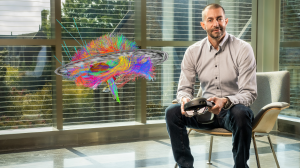We Are Outrageously Ambitious
Unlocking the Secrets of the Brain
The brain is the most complex organ in the body, and the diseases and disorders that affect it are some of the most challenging. Scientists at Duke are inventing novel approaches to understand the inner workings of the brain and to create ever more effective ways to repair and restore it.
Deep-brain stimulation (DBS), for example, is a well-established therapy that uses implantable devices to treat neurological diseases and movement disorders such as Parkinson’s disease. But no two brains are alike. Cameron McIntyre, PhD, a pioneer in the field of deep-brain stimulation, and colleagues at Duke are developing increasingly precise ways to administer these therapies and customize them for individual patients, giving each patient the most optimal treatment most optimal.
McIntyre and colleagues have recently developed an extraordinary visualization tool that translates human brain scans into interactive holograms. Using augmented-reality headsets, users can map blood vessels, axonal pathways, and the incredibly dense network of connections between regions throughout the brain. Multiple users can virtually examine and discuss the same brain in real time. The technology may one day help doctors collaborate to plan complex surgeries that are difficult to chart in 2D, such as removing brain tumors or implanting DBS electrodes.
Office for Strategic Communications, Duke University School of Medicine



